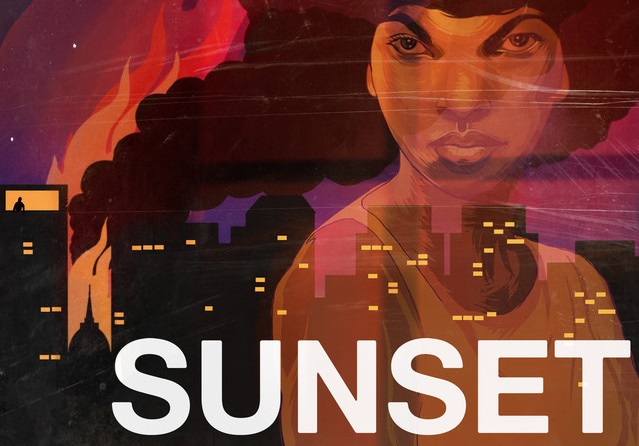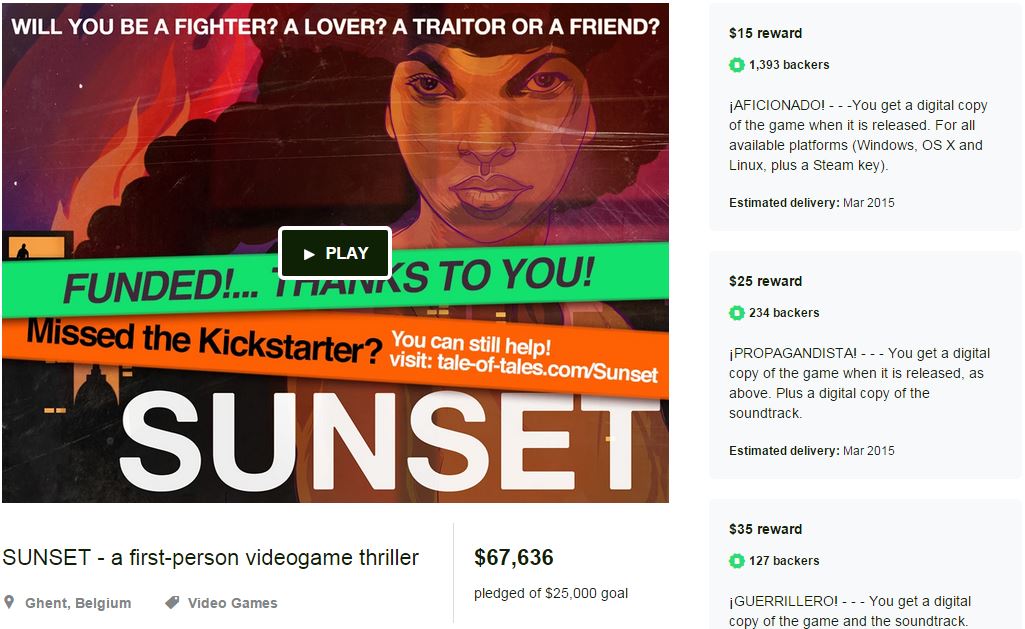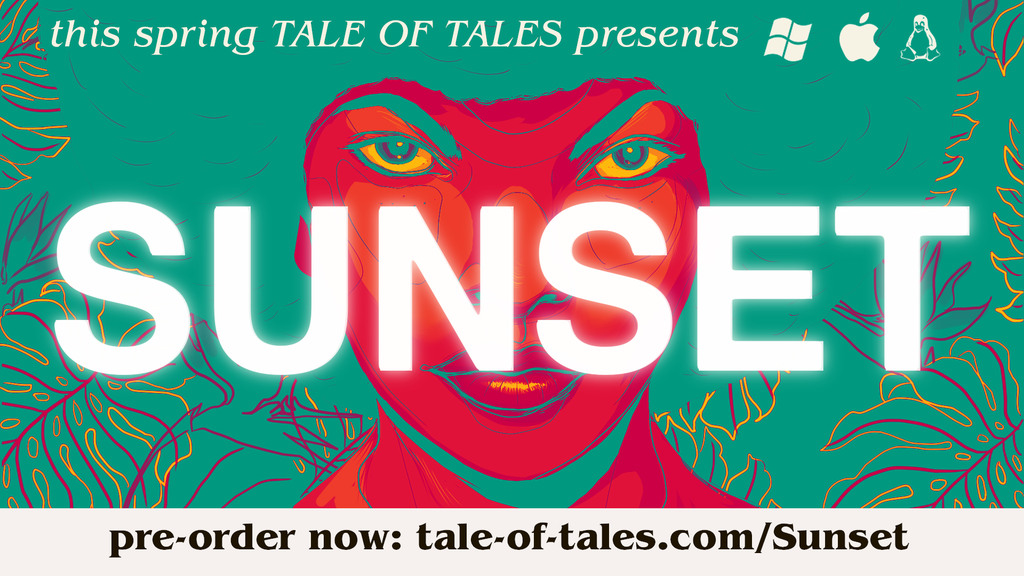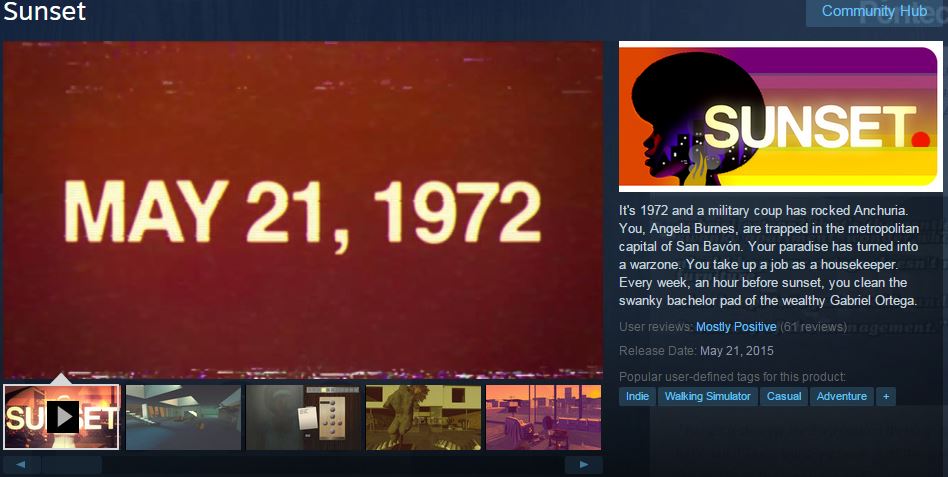On May 21, 2015 Sunset was released on Steam and itch.io. Reviews from critics dropped on release day and were all full of praise. People loved the environment, narrative, choices, and everything else that made Sunset what it is. And yet, it appears that the game did not end up selling many copies at all. According to a post from Tale of Tales, only a little over 4,000 copies of the game were sold at that moment — which includes Steam Summer Sale purchases. 4,000 does not sound absolutely terrible in and of itself until you realize just how much of that number is taken up by backers themselves.
Sunset accrued 2,228 backers during its Kickstarter run, with a potential for even more via post-campaign PayPal funds. The vast majority of this group received a copy of the game as the lowest tier ($15) included a digital copy. If we just operate off the Kickstarter backer count then that means around half of all people who own Sunset got it via a reward tier. Then, some 2,000 folks purchased a copy themselves once the game hit digital distribution shops. If we pretend that every single of these purchases was at $19.99 then that nets Tale of Tales $39,980 (not accounting for Steam fees and taxes). Now, obviously this is the highest imaginary number possible and therefore far exceeds whatever they did make post-Kickstarter. Why don’t I include backer funds as purchases?
Because they’re not. Sometimes campaigns suggest that copies of games included in reward tiers are “free.” Many backers believe this isn’t the case, after all, they are spending X amount of dollars with the intent of receiving a benefit for it. But step back for a minute and even backers with this mindset should realize that those are complimentary copies of the game. This is because backing a Kickstarter is meant to help fund the development of a project (in most instances). If you are helping to pay a developer’s salary or for the cost of something else integral to game development then that money has a purpose. It helps to facilitate the game you want to become a reality. Developers are basically eating the cost of rewards; the cost of lost potential sales once their product is finally available.
That’s one of the largest challenges Kickstarter presents. Do you have a project with a big enough audience to fund you during the campaign period? But is it also large enough to result in people buying your game once it actually comes out? Or are you so niche that you can make it with a crowdfunding campaign but rarely add new players down the line? In a sense, when niche games come to Kickstarter they may be cannibalizing their own sales. Many people who back games do so because they are desperate for more games of that genre. These are people that would buy a game brand new if they could, but are instead happily helping to fund their creation. It’s necessary, but when positioned at too small an audience there may not be anyone left to pay at launch.
It appears this is the challenge which Tale of Tales ran straight into. They had enough fans, and gained enough more, in order to make a great chunk of change thanks to Kickstarter. However, even more than doubling their campaign goal wasn’t enough money to make the game. This is another common (and often fatal) issue. They managed to scrape by and still create a fantastic game, but they did so at cost in hopes of reaping the rewards once Sunset was readily available, just as many other hopeful indie teams do.
Tale of Tales did more than just hope, though. They went so far as to hire a PR agency which did a heck of a lot for them. As someone who writes about games, I’ve been on Tale of Tales’ press list for a while, but suddenly I was receiving emails from another team about Sunset. This is a team with a wider reach, for sure, and games writers responded in kind. I saw tons of articles about the game prior to launch. Again, at launch there seemed to be a huge appreciation for Sunset in critical circles. Hell, they even took out a big ad on Rock, Paper, Shotgun to help get the word out. If I had to pick an audience who would probably best enjoy the game I’d select them as well.
And then… nothing. Sales occurred, but not to the degree you hope or expect given the intensely positive media reaction. When you put out information weeks and months in advance to generate hype you expect that to actually explode, not fizzle. Sunset’s launch was most definitely a fizzle, with only the few folks who missed out on the Kickstarter excited to buy. That’s not to say that gamers are wrong for not buying the game, as for all their attempts, Tale of Tales still produced a title with niche appeal. Again, I can’t help but feel that the majority of the niche came in to support the Kickstarter, leaving few to actually buy the game at launch.
Now that Tale of Tales is moving on from “commercial games,” I can’t help but feel a little saddened as well as relieved. Personally I feel that they deserved financial success after all this time, but I understand why the gaming market went mostly unresponsive. I hope that they continue to create all sorts of media — including games. Even if these are tiny interactive vignettes I’d be happy to experience them. Tale of Tales is just too beautiful a creator to disappear from the world of video games. If they choose to, at least they left a library of intriguing titles for new generations to discover.








I hadn’t heard of them until I started seeing articles about them quitting game development. They shouldn’t ever hire that PR agency again.
The video looks really interesting though, I put it on my wishlist for now.
(I don’t really like Walking Simulators though, although I guess the amount of ground to cover in an apartment isn’t going to be that much)
That second sentence so, so much.
Agreed! that PR company didn’t help 🙁
What is the dilemma of niche Kickstarters the title alludes to? Tale of Tales sought to make a niche title, their campaign was backed to a value they deemed sufficient, and then they developed and released Sunset. The figure juggling in this article seems to suggest that pursuing Kickstarter is a double edged sword for niche titles, but what are the other options? The traditional approach of securing a publisher would have been far less financially sound, with the publisher expecting a suitable return on investment. The reality is that most publishers wouldn’t go near niche games because they are too much of a risk, and so that is where Kickstarter is an ideal option,.
Personally, I was interested in Sunset and then I read the reviews on Steam. A majority are critical of the game and well reasoned about their criticism.